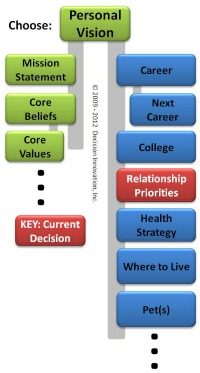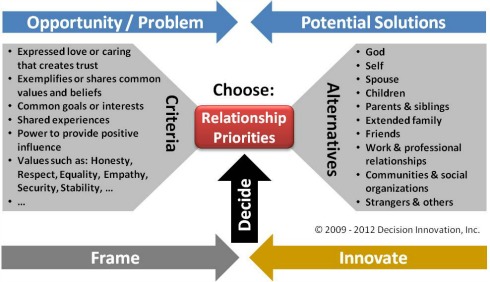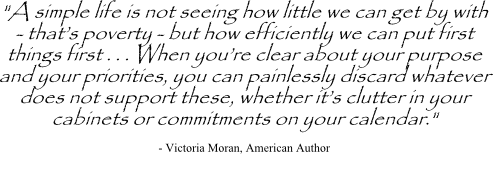Choosing relationship priorities that support your life vision
 In a review of the results from our "Most Urgent Personal Decision" survey, choosing relationship priorities has become the third most pressing personal decision, coming in behind #1 - career change decision and #2 - choosing a personal vision.
In a review of the results from our "Most Urgent Personal Decision" survey, choosing relationship priorities has become the third most pressing personal decision, coming in behind #1 - career change decision and #2 - choosing a personal vision.
Relationships take time and effort. Prioritizing relationships enables fulfillment of your personal vision and mission by establishing the importance and precedence that each relationship has in your life. This choice consciously addresses the question of "Who will be most important in encouraging me to become the person I would like to be now and into the future?"
Criteria for prioritizing relationships
Factors that can help in prioritizing relationships come from two major categories: criteria that support growth toward a personal vision and mission, and factors that promote the health, effectiveness, or goodness of a relationship.
Criteria that help prioritize relationships that encourage fulfillment of vision and mission include:
- Expressed love or caring that creates trust - Love establishes that the relationship has your best interests at heart and that self interests are suppressed or managed to prevent negative outcomes to the extent possible.
- Exemplifies or shares common values and beliefs - Within the scope of the relationship, shared values and beliefs help discourage activities that could cause conflict or harm.
- Common goals or interests - Shared aspirations provide motivation for mutual support and encouragement.
- Shared experiences - A shared background provides a foundation for understanding and communication that can promote growth.
- Power to provide positive influence - Coaching or mentoring relationships provide examples where the coach or mentor have knowledge or skills that can advance development through their influence.
Most of what we value comes from relationships, so relationship success factors will typically reflect what we value. Here are criteria that can be used to assess and prioritize healthy relationships:
 Honesty, Integrity, Sincerity
Honesty, Integrity, Sincerity- Respect, Honor, Politeness, Tact
- Fairness, Equality
- Acceptance, Empathy, Accommodation, Appreciation, Tolerance
- Security, Safety
- Communication, Connection, Contact
- Stability, Balance
- Harmony, Unity
- Energy, Enthusiasm, Empowerment
- Fun, Satisfying, Enjoyable
- Generosity, Compassion, Kindness
- Availability, Commitment
Choosing your core values before prioritizing relationships helps generate alignment with guiding life choices (the decisions highlighted in green), increases clarity, while making it much easier to reduce and adjust this list.
The relationship list
If you have ever coordinated a large social event, you have some sense of the difficulties that come with managing interactions with a large number of people. In reality, our day is filled with social interactions that are often the result of routine or unconscious decisions. Choosing relationship priorities helps to make us aware of time spent with others and reveals the impact relationships can have on our lives.
Here is a partial list of key relationships or relationship categories to consider for prioritization:
- God
- Self
- Spouse
- Children
- Parents and siblings
- Extended family
- Friends
- Work and professional relationships
- Communities and social organizations
- Strangers
With our world being more connected than ever, it is easy to see from this list how time for important relationships can get squeezed or lost.

Maintaining balance in relationships
 Besides the challenge of time for each relationship, we must also contend with different priorities from those we are related to. Each person will have different views on how much time to spend together, and on which activities. In many cases, needs may not yet be understood, making time planning difficult.
Besides the challenge of time for each relationship, we must also contend with different priorities from those we are related to. Each person will have different views on how much time to spend together, and on which activities. In many cases, needs may not yet be understood, making time planning difficult.
Choosing relationship priorities provides the guideposts for maintaining balance in relations. The choices for daily activities can be evaluated against these priorities to determine if they are in service of guiding life decisions. Harmful and unsupportive relationships are more easily identified and ended. Highest priority relationships can be given the time they need by taking time from those of lower importance. Opportunities to build multiple relationships simultaneously become easier to accomplish. Compromise takes less effort when the significance of the relationship is clear.
Applying this decision
Many of our relationships are the result of circumstances. We don't choose much of our family. In most cases we do not choose our manager. Prioritizing relationships allows us to choose having a relationship in some cases, and manage time and effort for relationships in cases where we don't choose.
Here are some ideas that can help when working through this decision:
- Prioritizing relationships is best seen as a "how to" decision for enabling life priorities from your vision and mission. It identifies who can enable and encourage those choices.
- Reviewing this decision can be very helpful when relationships are in transition. It can provide information that helps support beginning, ending, or investing in a relationship.
- Expect changes. When the life priorities from our guiding decisions change, relationship priorities should evolve to support them.
It is easy to go through life getting involved with relationships as they occur. Use this framework to help guide your relationships to enable a more intentional life.
Return from Relationship Priorities to Personal Decision Making

